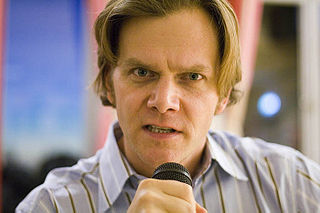A Quote by Jay Asher
If you're angry, you don't have to write a poem dealing with the cause of your anger. But it needs to be an angry poem. So go ahead... write one. I know you're at least a little bit angry with me. And when you're done with your poem, decipher it as if you'd just found it printed in a textbook and know absolutely nothing about its author. The results can be amazing...and scary. But it's always cheaper than a therapist.
Related Quotes
If you've ever been to a poetry slam, you know that the highest scoring emotion is self-righteous indignation: how dare you judge me. So in that way, the poem, 'What Teachers Make,' is an absolutely formulaic slam poem designed to allow me to get up on my soap box and say, 'Let me tell you what really makes me angry.'
I think that poetry is an act of celebration, that anytime you're writing a poem, it means that you're celebrating something, even if it's a sad poem, if it's an angry poem, a political poem or anything at all. The fact that you're taking the time and energy to pick up this thing and hold it to the light, and say, "Let's take some time to consider this," means that you've deemed it worthy enough to spend time on - which, in my opinion, is celebrating.
The subject of the poem usually dictates the rhythm or the rhyme and its form. Sometimes, when you finish the poem and you think the poem is finished, the poem says, "You're not finished with me yet," and you have to go back and revise, and you may have another poem altogether. It has its own life to live.
I definitely use life experiences. For me, it's extremely hard to write about something I don't know anything about. If I've never been angry, then I can't write about being angry. We're human beings so we all have emotions. To just have that knowledge, it definitely helps me out as a singer songwriter.
A successful poem says what a poet wants to say, and more, with particular finality. The remarks he makes about his poems are incidental when the poem is good, or embarrassing or absurd when it is bad and he is not permitted to say how the good poem is good, and may never know how the bad poem is bad. It is better to write about other people's poetry.
Whenever you are in anger, remember yourself. In that very remembering the focus changes, the gestalt changes. You become more and more centred. Anger remains there just on the periphery of your being, but you know now that it is separate from you. You are not angry, you are only a witness to it. Now it is up to you to choose to be angry or not to be angry. You are no more identified; hence the freedom to choose.





































